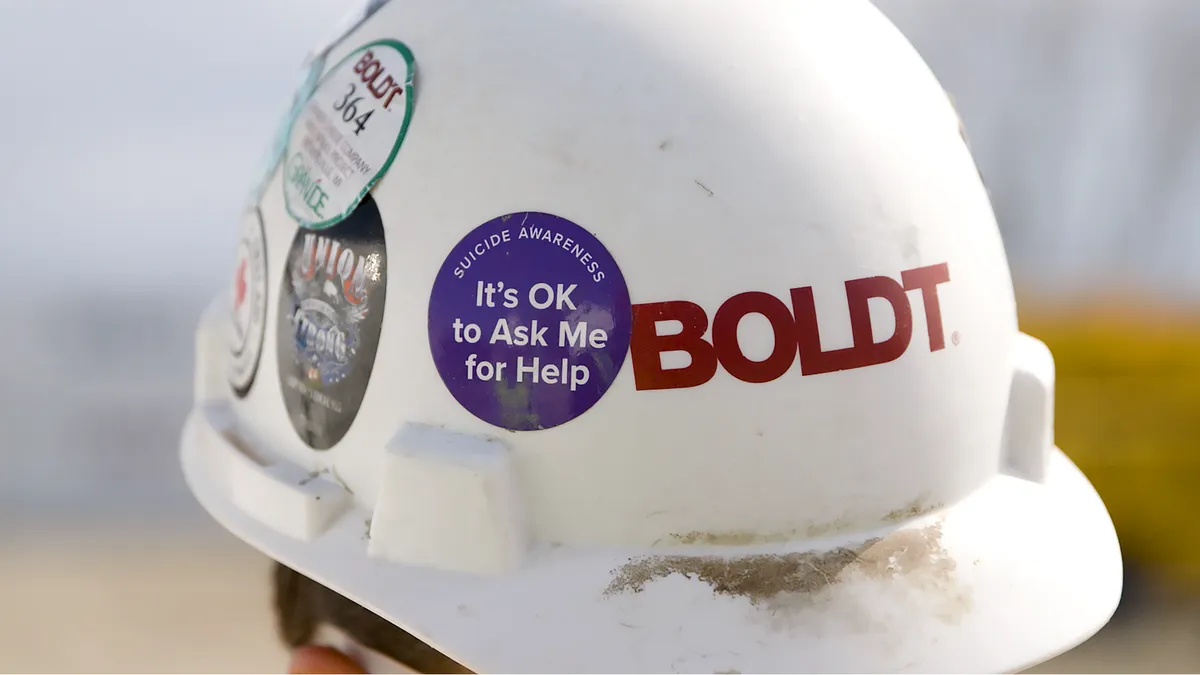Dive Brief:
- The Boldt Co. is emphasizing its peer-to-peer suicide and mental health awareness program during May, Mental Health Awareness Month. The initiative launched last year as a small pilot and has since expanded and become a permanent program.
- Employees seeking assistance can approach fellow employees who volunteer as "gatekeepers" to provide support and information about mental health resources. Purple stickers on hard hats, computer terminals and desks identify the gatekeepers.
- The nearly 100 people who serve as gatekeepers at Boldt's job sites and 17 offices nationwide participate in ongoing training sessions and quarterly meetings.
Dive Insight:
Construction has one of the highest suicide rates compared to other industries, according to the Centers for Disease Control and Prevention. The 2016 suicide rate for men in construction was nearly double that of other professions and five times greater than all work-related construction fatalities in 2018. The CDC says suicide deaths among working-age individuals across all professions increased 40% in less than 20 years.
The construction workforce is male-dominated and has a reputation for being highly masculine, which, sources say, often results in a culture of discomfort with discussing feelings and mental health. This adds to the stigma associated with mental health disorders, which can prevent people from seeking care.
Boldt's gatekeeper program addresses both suicide specifically and mental health broadly.
"The reason the program exists is because of the high volume of suicides in the construction industry... It's about making it more comfortable for people to ask for help," said Holly Lifke, chief human resources officer and executive vice president at Boldt. "But of course, suicide is just one element of mental health."
The general uptick in deaths by suicide have prompted action among organizations and businesses to shine a brighter light on suicide and mental health awareness.
This spring, Construction Dive spoke with experts about the industry's high suicide rate, and they weighed in on contributing stressors — high risks, injuries, erratic schedules, travel, lack of open discussions about mental health — and the importance of considering mental health a part of work safety.
"People think it's a personal issue and not a business issue. But it's absolutely a business issue," Lifke said. "From an economic perspective, it's been indicated that by 2030, depression will be the leading cause of lost productivity in all economically advanced countries."
Skanska UK recently launched a program in which team members with mental health training wear a green sticker on their hard hat, signaling them as a resource for workers who want help or to discuss mental wellbeing. The concept is similar to the purple identification stickers in Boldt's gatekeeper program.
Gatekeepers are not mental health professionals who conduct official therapy sessions. Rather, they help find therapists or other resources. Employees who approach a gatekeeper can "expect to have a non-judgmental, open conversation where they can hopefully freely talk about the way that they're feeling [and] have a lending hand from the peer," said Renee Wolf, health coach at Boldt who is also a gatekeeper.
Mental health professionals indicate the pandemic has had the surprising effect of reducing mental health stigma. People's widespread struggles during the pandemic normalized the issue and underscored the importance of reaching out for help when necessary.
"Maybe the only positive to come from COVID is the fact that people are more comfortable talking about our mental health," Wolf said. "People are realizing that our mental health is very fragile."
Making the gatekeeper program so visible further helps to destigmatize asking for help, Lifke said. Meanwhile, Boldt aims to continuously modify and build on the program.
"It's not a one-and-done thing," Wolf said. "These people need to make sure that they're on top of their games to be able to have these conversations."
The program helps people "understand that we're all there at some point" and that many experience mental health challenges at times, Lifke said. "Maybe we can talk to people before it gets to the point of suicide ideation. And maybe we can help people to live happier, more productive lives."













